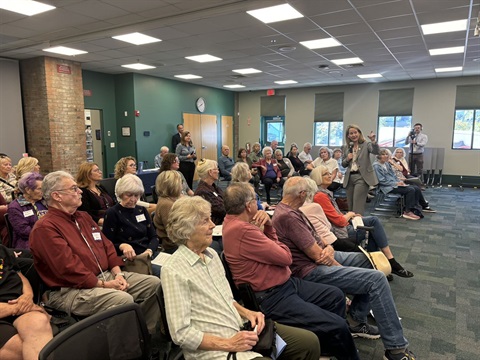AZ ATTORNEY GENERAL REINFORCES EFFORTS TO STOP SCAMS AT PRESCOTT EVENT
Published on October 23, 2024

Arizona Attorney General and Prescott native Kris Mayes, speaking at the library where she said she learned how to read when she was a child, reinforced the importance of knowing how scam artists operate, echoing the message YCSO has been spreading countywide this year, hoping to save residents from losing money to the fraudsters.
AG Mayes, who commended YCSO for its efforts to protect citizens from the scammers through various means of communication, told about 50 local residents who attended the public meeting that her office receives some 17,000 complaints a year, and that Arizona was tops in the nation last year when it came to senior citizens victimized by frauds and scams. She said the prediction that older adults will outnumber those under the age of 18 in the U.S. in 10 years only makes the need for vigilance more important.
One important aspect of preventing fraud, according to Mayes, involves family and trusted friends. She urged them to check in on the elderly folks in their life on a regular basis to see how they are doing, and to perhaps notice changes in mood or behavior which may be indicative that they have become a scam victim. The AG said changes in spending patterns and keeping financial matters a secret from family and friends could be another indicator of fraud issues.
Mayes told the crowd that everyone needs to stay informed of the latest scams and they should never give out personal or financial information to strangers who contact them by text, e-mail, or telephone, no matter how persuasive they may be. She said scammers play on the emotions of their intended victims and try to get them to act quickly without verifying who is contacting them or giving careful thought to the scammer's claims. The AG also said folks should have a very secure password for their financial accounts, should monitor their bank accounts consistently, and should discuss suspicious offers with family or trusted friends before taking action.
Mayes said one of the top ongoing scams involves online romance through dating sites or social media contacts. Scammers prey on those who are lonely, perhaps due to having lost a spouse and needing companionship. She said "love bombing" is a common tactic but warned that the person telling you they love you is likely out to steal your money once they gain your trust. "They will ask you to wire money to them or to use cryptocurrency for phony investments or personal hardships," she said. Mayes said social media platforms do a "terrible job of policing these scams", and indicated she may file legal action on this issue in the future.
Another common scam uses a phony call from a younger relative who is supposedly in some type of emergency and needs money fast, again by wire transfer or cryptocurrency. With artificial intelligence (AI), scammers can mimic the actual voice of a relative (usually in the background of the call) to try and convince the senior citizen that the situation is real. Mayes said hang up and call the relative yourself to verify they are ok, and she urged families to have a "code word or phrase" to be used only in case of emergency, one that the scam caller would never know. She said even one of the attorneys in her own office was contacted by such a scammer.
The AG said other current scams include phishing e-mails, which warn that a financial or other account has been suspended or closed, and you need to "click here" to begin to fix it (when such a click will only take you to a site where your personal or financial information can be stolen), investment fraud schemes that promise high returns with little risk (and want you to use wire transfer or cryptocurrency to begin the process), and fake charities (for victims of disasters like hurricanes, or first responder agencies wanting to raise money for some cause).
If you get any such contact from suspected scammers, please contact the Arizona Attorney General's Office (602-542-5763), the Federal Trade Commission (FTC.gov) and the YCSO Fraud Investigations Unit (928-771-3299). You can verify a company's Better Business Bureau standing at Bbb.org or by calling 877-291-6222.